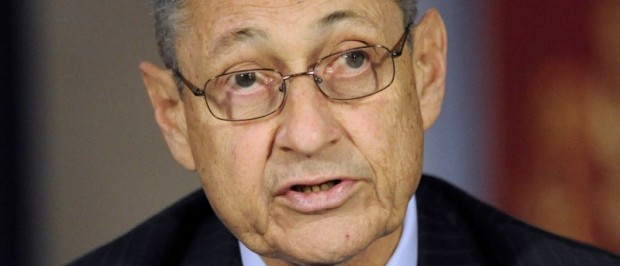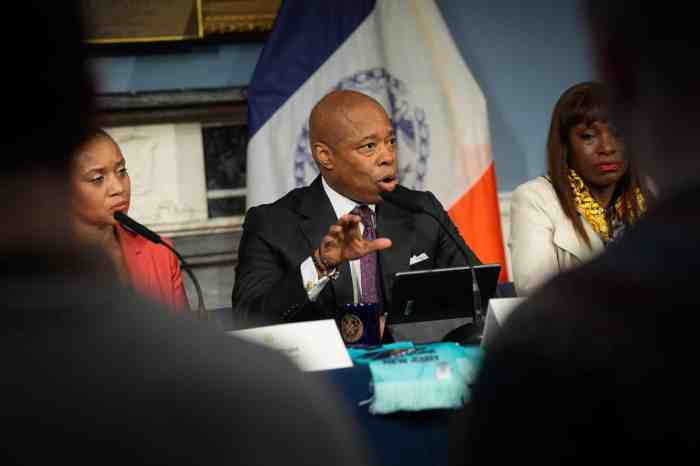
Many are taking pleasure in Sheldon Silver’s downfall. He stands accused of pocketing nearly $4 million illegally and, if convicted, could spend two decades in federal prison. At the same time, for community members who have benefitted from his good work in the Assembly, there is also pain.
The charges against Silver, who until this week was Assembly speaker, are numerous and serious. If true, there is nothing in Silver’s record that could justify them — but that also does not mean that his accomplishments should be overlooked.
Though he remains innocent until proven guilty, with budget negotiations beginning, the Assembly needed a new leader. He plans to hold his Assembly seat — at least for now — while he fights the charges made by U.S. Attorney Preet Bharara. If Silver ends up running for reelection next year, we suspect he would face his most serious challenge ever, and as it should be, it would be up to the people of Lower Manhattan to decide whether he would continue in office.
Bharara reportedly is also probing the courts, where Silver installed judges — friends of his since their childhood together on Grand St. — allegedly favorable to his law firm’s lucrative asbestos patient cases. Even Governor Cuomo is said to be in Bharara’s sights for having abruptly shut down the Moreland Commission last year. In short, what did Cuomo know about the investigation into Silver, and what deal did he possibly cut with him, before the anti-corruption panel was terminated?
“Stay tuned,” Bharara announced after Silver’s arrest two weeks ago.
And so the New York Legislature continues to live up to its reputation as one of the country’s most dysfunctional. The list of top pols convicted or ushered out of office under a cloud of charges — Eliot Spitzer, Malcolm Smith, Pedro Espada, Alan Hevesi — only seems to grow.
Legislators’ outside income continues to be a serious problem, and now has been Silver’s downfall. State Senator Brad Hoylman, leading the way toward reform, has proposed limiting legislators’ outside income to $15,000 annually, and banning them from practicing law, which currently opens the door to the sort of graft Silver is accused of finagling. As Hoylman noted, the details of this sort of outside work “are often shrouded in secrecy and can contribute to conflicts of interest.”
There are many problems with Albany’s “three men in a room” system. Most obvious is in the name — there has never been a woman in any of the three key posts. Until this week it has also always been three white men. We hope Carl Heastie, the first black Assembly speaker, brings change for the better.
Of course letting the governor, Assembly speaker, and Senate majority leader make all the important decisions shuts out most of the state.
But that doesn’t mean nothing positive came out of the old system. When it came to representing his district, Silver often echoed the voices of key community leaders and the many thousands they represented, so they were in a sense helping make decisions on vital issues like schools and affordable housing. It’s easy to dismiss this as mere pork brought home by a too-powerful legislator, but that would be wrong. The problems of Lower Manhattan went well beyond our area, and the state was well-served to have Silver focusing attention on it.
Lower Manhattan had two unique crises. One of course was the Sept. 11 terrorist attack, which in addition to the senseless destruction of life, also had a devastating economic effect on Downtown. Silver’s advocacy meant the rebuilding was done better and with more of the community’s interests in mind.
The second was Lower Manhattan’s unprecedented population growth, which has dwarfed all other parts of the city. Silver formed a School Overcrowding Task Force and made the city’s Department of Education address the problem. There’s little question that there would have been as many schools built as quickly without Silver leading the charge and brokering some of the deals to make them happen.
On the negative side, Silver let the commuter tax be killed, depriving the city of millions of dollars in annual income. Bowing to pressure from his Assembly conference, he nixed Mayor Bloomberg’s congestion-pricing plan, which would have slashed auto traffic in Manhattan and provided desperately needed funds to expand and improve our transit system.
Catering to his Grand St. base, Silver long resisted redevelopment of the Seward Park Urban Renewal Area , favoring economic development over low-income housing.
But when, after decades, a consensus plan for SPURA emerged, he finally did support it. And so, “Shelly Silver’s parking lot” is now being transformed into housing with a mix of incomes and retail.
Silver’s legacy — the good, the bad and the ugly of it — will all be sorted out over time, as will the charges against him. Still, he deserves our thanks for the good that he did on the local level, and it was a lot.
If his departure as speaker causes the Legislature to be cleaned up, it’s obviously all for the best, but there’s still a long way to go on that.

















